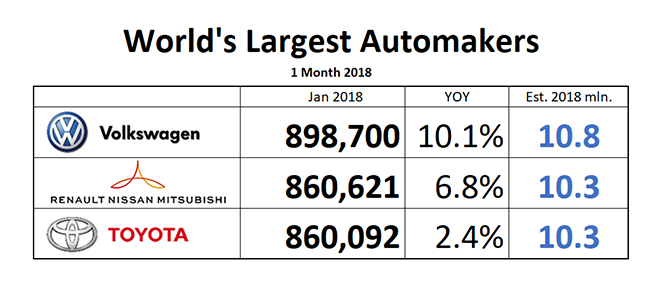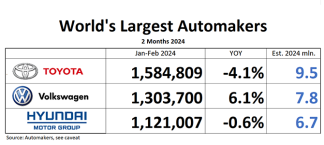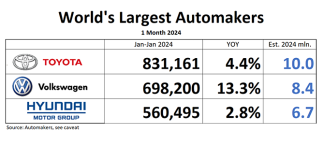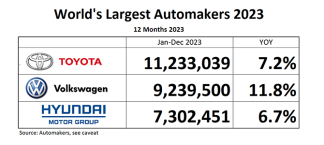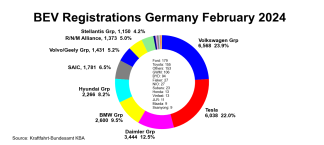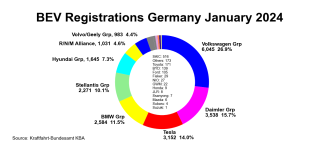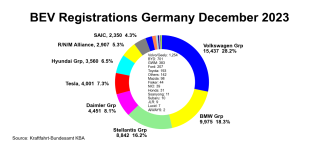And they are off: The race for World’s Largest Automakers 2018 ended the first of its 12 laps with Volkswagen way ahead of the Renault-Nissan-Mitsubishi Alliance and Toyota. Separated by only 529 units, the Alliance and Toyota are neck and neck.
With a 10.1% unit growth over January 2017, Volkswagen continues its strong showing of the last two months of 2017, giving the lie to those who mused that the Germans could have brought a few units forward into 2017 to regain the top spot.
The 2nd placed Alliance was dragged down by Nissan, which started the year with only a 0.5% increase over its January 2017 production figures. The Alliance’s growth champion again is Mitsubishi, increasing its January output by 23% over the same month last year.
Toyota continues on its stoic lower single digit growth path.
Meanwhile, Volkswagen’s strong growth is triggering widespread incredulity. Speaking for all who can’t believe how universal villain Volkswagen can rack up record sales, @frank_trainor tweeted:
“How are people who are concerned about emissions buying from a company that cheated on emissions standards so blatantly? This vexes me.”
It is a well-known fact in the auto industry that unless scandals affect the individual buyer, they rarely change sales in a big way. When the dieselgate scandal hit in Europe, diesel sales did not budge until diesel bans loomed in many cities. Then, diesel dropped precipitously, with car buyers mostly switching to gasoline instead of electric cars. Customers may voice strong environmental opinions in questionnaires, but in the privacy of a car showrooms, convictions tend to fall to the wayside. While electric cars get all the headlines, gas-guzzlers get most of the sales.
To wit:
“In droves, Americans are turning their backs on family sedans and small cars and flocking to bigger, roomier models like sport utility vehicles and trucks,” writes the New York Times. “In January, two of every three new vehicles sold were classified as trucks, including S.U.V.s, pickups, minivans and the lighter cousins of S.U.V.s known as crossovers.”
Note: This analysis attempts to track production, not sales, because this is how the world automaker umbrella organization OICA ranks automakers.
Due to the different methodologies of their measurement, “sales” numbers have proven to be unreliable, and prone to ‘sales reporting abuses,” as recent scandals in the U.S., along with rampant “self-registrations” in the EU have shown.
At the same time, data reported by automakers are becoming increasingly hard to compare.
Toyota reports production only. Volkswagen reports “deliveries” to wholesale – which is, at least for this exercise, close enough to production. The Alliance numbers are a blend of production data reported by Nissan and Mitsubishi, and deliveries reported by Renault.
